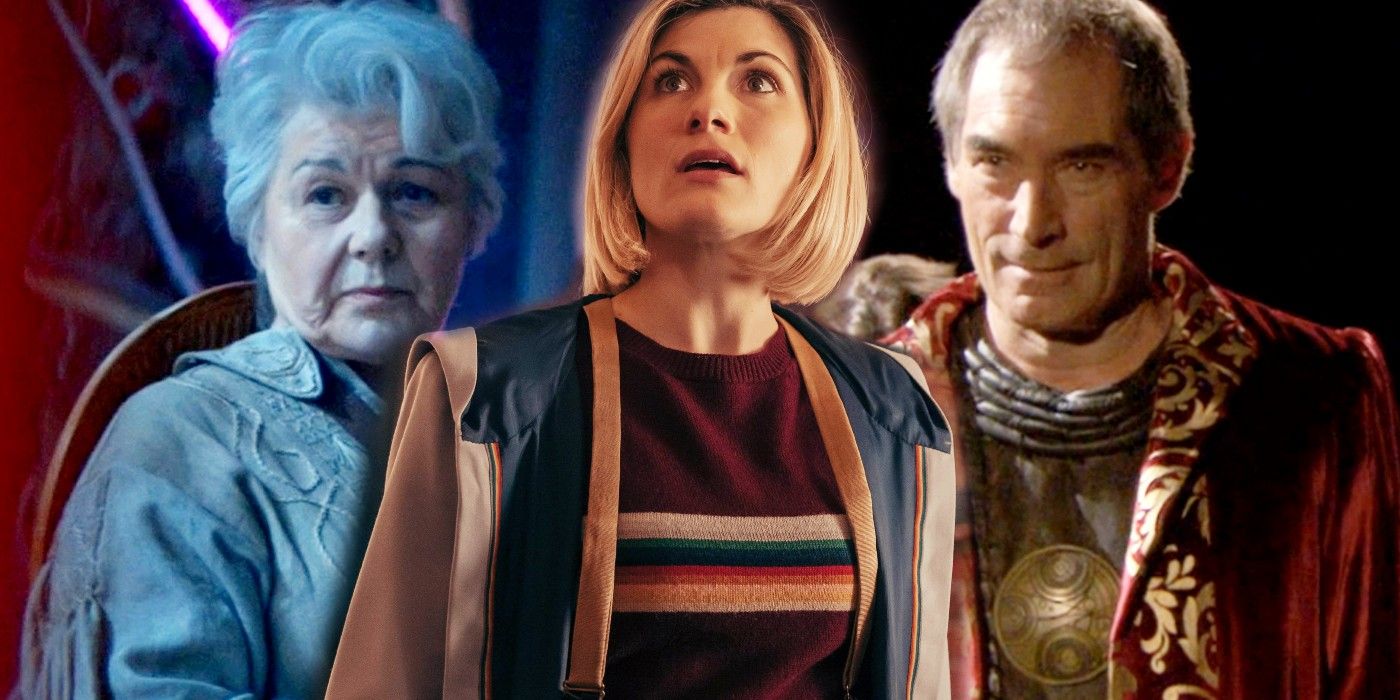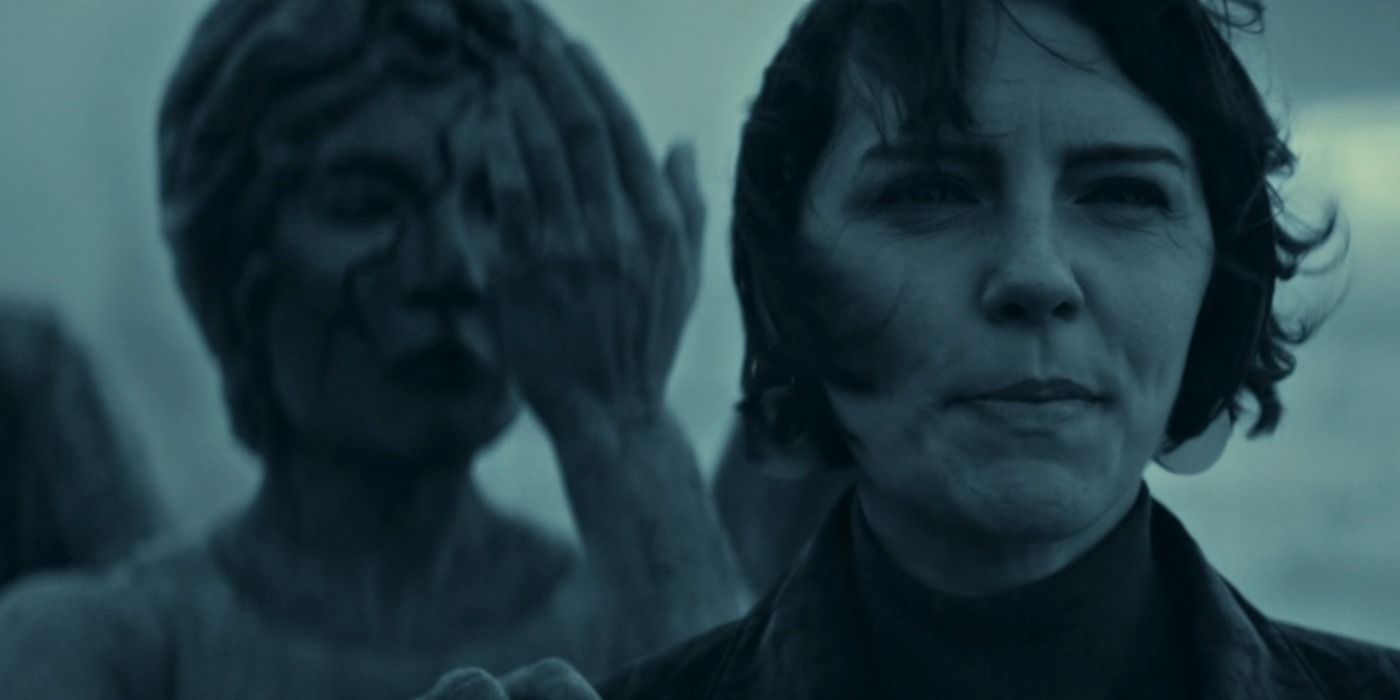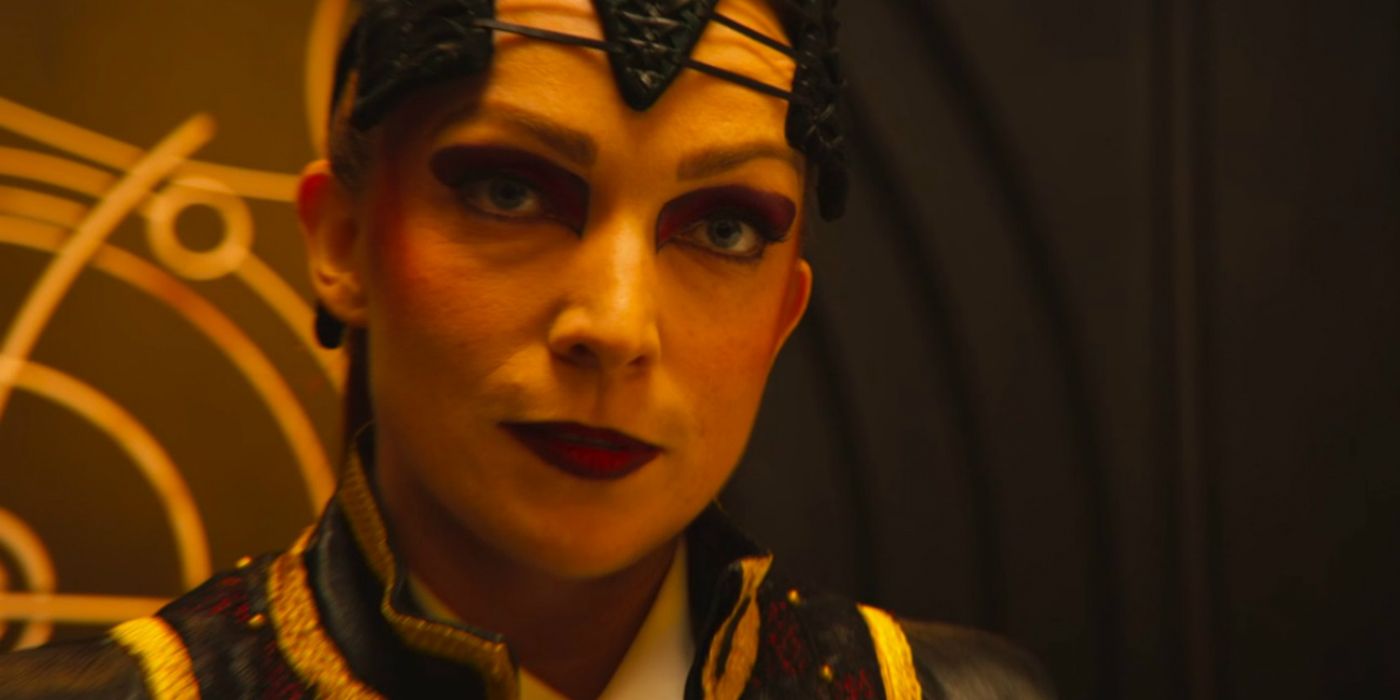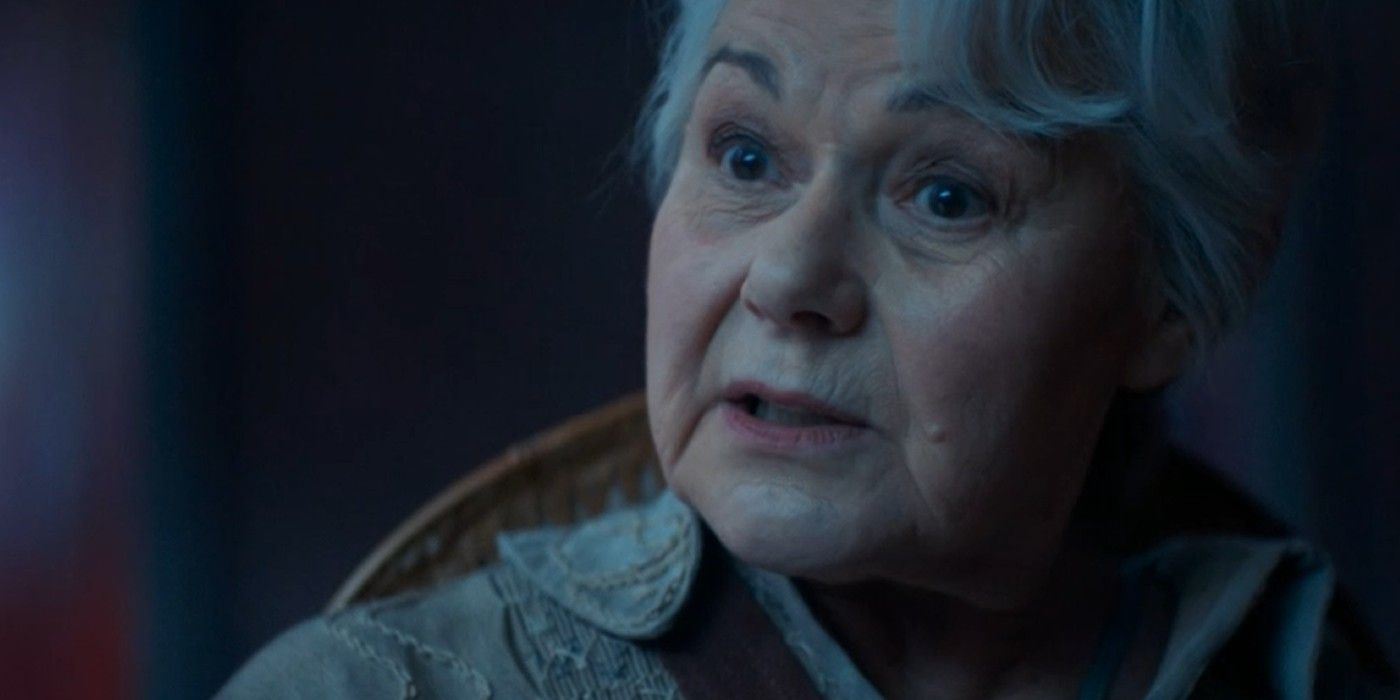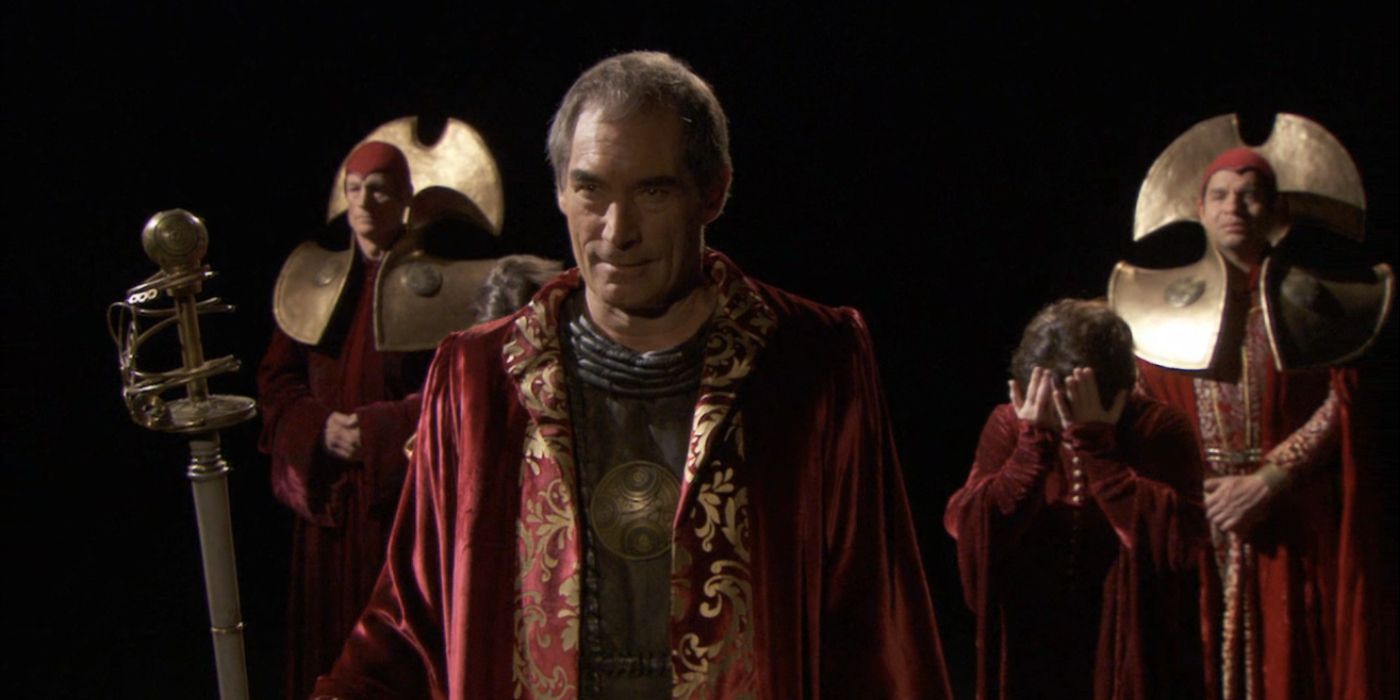Where temporal trouble is found in Doctor Who, the Time Lords usually aren't far behind - does this mean the true villains of Doctor Who: Flux hail from Gallifrey? Telling one big, franchise-shaking story across 6 episodes, Doctor Who: Flux is a hugely ambitious gambit from Chris Chibnall. The narrative begins with the Ravagers - Swarm and his sparkly girlfriend, Azure - freed from imprisonment, which somehow triggers a cosmic devastation know as the Flux, destroying planets and warping the very nature of time. The Doctor battled the Ravagers back when she looked like Jo Martin, restoring the Temple of Atropos on the planet Time, and Jodie Whittaker's Thirteenth Doctor does exactly the same in Doctor Who: Flux.
Nevertheless, Swarm and Azure aren't the main villains of Doctor Who's current run. Powerful and despicable they may be, but the Ravagers are merely pawns in a larger clandestine scheme involving the Flux and The Doctor herself. Doctor Who: Flux's top antagonist spot is, therefore, a vacancy waiting to be filled, and though there are plenty of candidates (The Master, The Valeyard, the Pting...), the safest bet looks to be Time Lords.
Doctor Who season 12 revealed The Master destroyed his kin after uncovering their universe-shattering Timeless Child secret - The Doctor is not one of them. But the elaborately-dressed folks sitting on Gallifrey's throne are infamously tricky to get rid of, and all signs point toward Time Lords as masterminds behind the Flux. Here's why.
Flux Has Set Up The Division As Doctor Who's Big Villain
Swarm and Azure might display the sinister swagger and loud fashion sense of stereotypical arch-villains, but Doctor Who has paved the way for an even darker threat - The Division. Introduced by Doctor Who season 12's "Fugitive of the Judoon," Division is an all-powerful organization spanning time and space... and The Doctor's former employer.
Jodie Whittaker spent the gap between seasons 12 & 13 investigating Division, and "Village of the Angels" ends with the Thirteenth Doctor recalled by a Weeping Angel reclamation squad. Swarm and Azure represent fascinating additions to Doctor Who lore, but their names were meaningless until 4 episodes ago. The Division, on the other hand, is a long-standing mystery in need of resolution, deeply entrenched into The Doctor's personal arc, and its reputation grows more foreboding with every mention. The temporal hit-squad is neatly primed as Doctor Who: Flux's inevitable true villain.
There's still an umbrella handle question mark over whether The Division is evil, in the traditional sense. When Jo Martin's Fugitive Doctor leads her squad into the Temple of Atropos, they actually appear heroic. Her team apprehend a villain, prevent a cataclysm, rescue innocent civilians - all things The Doctor herself would do - and even in the present timeline, Karvanista is still a good boy. On the other hand, The Division's hidden darkness is seeping out every crack and corner. Why aren't agents allowed to leave? Would heroes really cooperate with Weeping Angels? And why would the likes of The Doctor and Karnavista run from Division if there wasn't a huge downside? Division might save the day when it suits them, but they seem to possess very few moral boundaries. For instance, would Division wipe out one universe if it meant preserving the multiverse?
How The Division Is Connected To The Time Lords (& Is It Still)
Doctor Who: Flux hasn't yet explained how Division was founded, nor who its leader might be - and this is where those pesky Time Lords come in. At time of writing, Doctor Who can't quite make up its mind about Division's origin. In The Doctor's forgotten memories, Solpado claimed Time Lords must occasionally break their policy of non-interference and Division was formed for this purpose. Then when The Doctor(s) were captured by Judoon, the Division officer who requested their arrest was a Time Lord called Gat (played by Ritu Arya). Season 12 specifically presented Division as a Time Lord agency.
The connection between Time Lords and Division is rapidly getting the retcon treatment in Doctor Who: Flux. The organization is no longer exclusive to Gallifreyans, but Lupari, Weeping Angels, and every other species throughout space and time according to Claire. Indeed, she describes Division as an all-encompassing, omnipotent agency - "Every species, every world, every moment."
Chris Chibnall might've experienced an inter-season change of heart, but Division's Time Lord connection hasn't been canned completely in Doctor Who: Flux. Maybe Division was founded by Time Lords, but grew powerful and evolved into a multi-species outfit unrestricted to any single planet or time period. Time Lords likely still command The Division (hence why The Doctor, Solpado and Gat all occupy positions of authority), and this means whatever evil might be bubbling beneath the surface is, ultimately, the brainchild of Gallifrey's finest.
Theory: The Time Lords Return As Doctor Who: Flux's Real Villains
The all-important clue indicating Time Lord involvement in Doctor Who: Flux comes via "Once, Upon Time." While flux-ing around a Mouri time storm, Jodie Whittaker's Thirteenth Doctor is abruptly transported to a strange switchboard occupied by an unidentified woman with gray hair. The stranger's embroidered robes appear somewhat Gallifreyan in design, and she obviously knows more about time's true nature than even The Doctor. Crucially, she reveals the Flux was released intentionally, and the Ravagers were nothing more than a "temporal poison" as part of a larger plan. The mystery woman (the latest in a long line of Doctor Who mystery women) ominously says the Flux wasn't "enough" to end the universe... and it was unleashed due to The Doctor herself.
The Doctor has no idea what's going on (giving the audience even less chance) but according to popular belief, this woman is both a Time Lord and a leading member of The Division. Many viewers also suspect she's the latest regeneration of Tecteun - the woman who adopted The Doctor and actually introduced her to Division. Potentially, Tecteun and the Time Lords leading Division have now decided our universe must end, and engineered the Flux for that very purpose. The Doctor's job, of course, is to stop them, which would mean Jodie Whittaker facing off against her own adopted mother, Gat, Salpado, and any other Gallifreyan still calling shots for The Division.
The shocking line, "The Flux wasn't an accident... it was made... because of you" supports Doctor Who's Time Lord villain theory. Only someone present during Gallifreyan civilization's founding years would know The Doctor's secret past. Maybe when The Doctor fell from her native universe into ours, the Flux became necessary to balance the paradox - the price the Time Lords paid for harnessing the Timeless Child's regenerative abilities. Now, Division has decreed the only solution is to end this universe altogether.
What The Return Of The Time Lords Would Mean For Doctor Who
Time Lords have been troublemakers ever since the Second Doctor's classic final episode, "The War Games" - but never have they turned into outright villains. Even when Rassilon went hardcore megalomaniac during the Time War, his supporters were just a small cabal among Gallifrey's elite population. Disagreements aside, The Doctor has always held an affinity for her people, but because the Timeless Child removed The Doctor's Time Lord lineage, Doctor Who can now turn the race truly evil. The emergence of Division could finally trigger a war between The Doctor and the Time Lords that rumbles into future seasons, dispelling any notion that Gallifrey's temporal fiddlers are mostly good guys, and making The Doctor's adopted race every bit as dangerous as the Daleks or Cybermen. Doctor Who could even revisit Omega - an evil Time Lord that Division might have use for.
Time Lords masterminding Division in Doctor Who would also confirm Gallifrey's true power and purpose has always remained hidden. Let's assume Mrs. Exposition from "Once, Upon Time" is, as suspected, a Time Lord leading The Division. That would mean Time Lords have affected history far more than Doctor Who has ever let on. In Flux alone, they've released the Ravagers and decided an entire universe needs to end. What other major events are Division responsible for?
And if Time Lords really are behind everything in Doctor Who: Flux, they must also control a wider multiverse, rather than Gallifrey's universe alone. The mystery woman claiming "this universe is over, Doctor" strongly suggests her power extends to other planes, like the one the Timeless Child first fell from. The Division - and by proxy the Time Lords also - could potentially exist across universes, traveling throughout the multiverse and "balancing" realities as they see fit. Certainly, the Time Lords returning in Doctor Who: Flux would give Russell T. Davies plenty to play with in future seasons.

